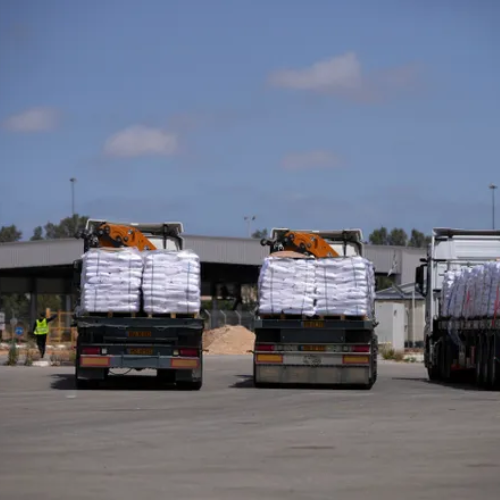After nearly three months of a strict blockade, the first aid trucks have entered Gaza. These trucks are carrying much-needed supplies like baby food and medicine. This is a relief for the 2 million people living in Gaza, many of whom have been struggling without enough food or medical help.
Only five trucks were allowed through the Kerem Shalom crossing at first. This is a tiny amount compared to the hundreds that used to enter daily during the last ceasefire. Experts warn that Gaza is facing a famine, meaning a serious shortage of food that could cause many people to starve.
The United Nations called the arrival of these trucks “a welcome step,” but they also said it’s just a “drop in the ocean” compared to what Gaza urgently needs. More trucks have been cleared to enter, but the situation on the ground is still very chaotic. Aid workers worry that some supplies might be stolen because resources are so limited.
Allies Pressure Israel to Do More, Threaten Sanctions
Israel’s Prime Minister explained that the decision to allow some aid was made after Israel’s close allies told they could no longer support Israel’s military actions if the world saw pictures of people in Gaza starving.
Shortly after the aid trucks arrived, the United Kingdom, France, and Canada issued a strong joint statement. They called the small amount of aid “wholly inadequate” and warned Israel that if the situation does not improve, they might face “concrete actions,” including sanctions. Sanctions are punishments that can include things like trade restrictions or freezing financial assets.
These countries mentioned they support Israel’s right to defend itself but called Israel’s new military actions “disproportionate,” meaning they think Israel’s response is too strong compared to the threat it faces. They also criticized Israel’s plan to control how aid is delivered inside Gaza, saying it could prevent aid from reaching many people who need it.
Israel Furious as US Slaps 17% Tariff—Higher Than Iran’s, Despite Removing Tariffs on US Goods
Israel rejected the joint statement and called it unfair, linking it to attacks against Israel that happened earlier this year. Meanwhile, many other countries, including Germany, Italy, and Japan, have also asked Israel to fully open the borders to humanitarian groups like the UN to deliver aid without restrictions.
Gaza Faces Growing Crisis Amid War and Displacement
Israel launched a new wave of attacks on Gaza, including air strikes and ground operations. As a result, many parts of Gaza, including its second-largest city, have been badly damaged. The fighting has killed tens of thousands of Palestinians, mostly women and children, and has forced nearly 90% of the population to leave their homes at least once, many multiple times.
Israel says it is trying to pressure the group Hamas to release hostages taken during an attack in October. Hamas has stated it will only release the hostages if Israel agrees to a ceasefire and pulls back its forces.
Sanders Fights to Block US Arms Sales to Israel Amid Gaza Crisis
Israel’s leader mentioned Israel plans to take full control of Gaza and wants much of the population to move to other countries. Many Palestinians strongly disagree with this plan.
Aid groups are concerned about a new system backed by the United States, where the Israeli military would guard aid distribution centers mostly in southern Gaza. This could force many people to move again and could prevent aid from reaching those in need. UN agencies and other groups have said they will not take part because the plan might use aid as a political tool rather than purely helping people.


